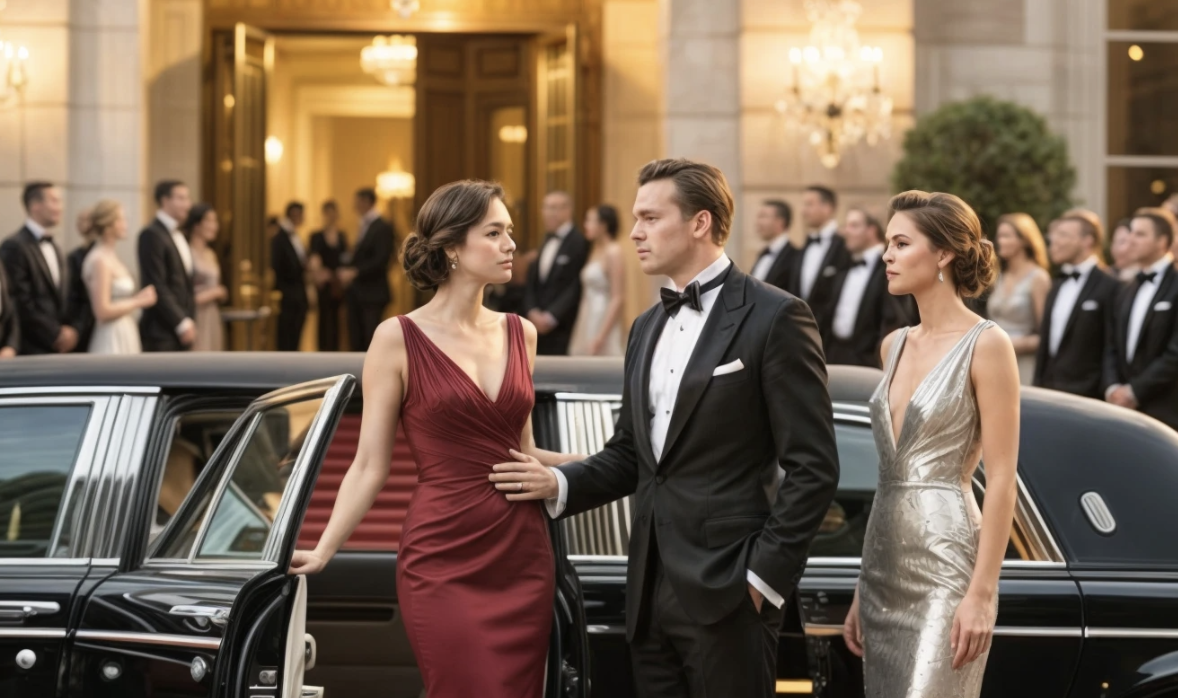She entered the opera on the arm of a stranger, and in that instant his perfect world crumbled to dust, exposing the ruins he himself had built. The two tickets to the performance—the coveted slips of paper for which he’d been playing the art connoisseur—nearly slipped from Arthur’s numb fingers when he saw the black limousine, polished to a mirror sheen, glide up to the glittering entrance of the Grand Opera. The air of that cold Paris evening was a dense cocktail of wet asphalt, expensive perfume, and the anticipation of celebration. His fingers instinctively, almost animalistically, tightened around Liliya’s hand—young, radiant, still unaware that she was nothing but a bargaining chip in someone else’s game. And then, as if in slow motion, the car’s frosted door swung open.
And she appeared. Victoria. Not as a wife, not as the familiar shadow in his life, but as a goddess of cool, calculating retribution, clad in a ripe-burgundy dress that—he knew this for certain—cost more than three months of his salary. Silk streamed over her figure like liquid copper, shimmering in the spotlights. She did not deign to give him a single glance, as if he were an empty space, a ghost unworthy even of a passing look. Arthur stood paralyzed while Victoria—his Vika—the woman who had brewed his morning coffee for fifteen years, ironed his shirts to a knife-edge, and silently listened to his endless dinner monologues, walked into the temple of art with her chin held high. Her hand rested in the crook of the arm of a man in an impeccably tailored tuxedo, from whose posture and quiet self-assurance wealth and power seemed to seep.
Arthur had never seen this man before. The stranger leaned toward her, whispered something, and the corner of her lips trembled with the slightest, but utterly genuine smile. He held her arm with the tenderness reserved for someone truly precious, with a respectful awe Arthur realized he had perhaps never felt for her.
“Arthur, darling, who are those people?” Liliya whispered, and the first notes of anxiety sounded in her voice, eclipsing the joy of the long-awaited evening.
Arthur didn’t answer. He couldn’t. His throat was gripped by a tight, invisible noose of shame and realization. Because in that icy second the whole monstrous truth dawned on him. Victoria knew. She had known for a long time. And this evening, this opera, this chance encounter—there wasn’t a drop of chance in it.
It wasn’t just a show of force. It was a meticulously planned, cold-blooded declaration of war, launched without a single shot. A war he had already lost before he even knew it had begun.
Arthur had always thought of himself as fortune’s favorite, a golden boy destined for a special, shining fate. A solid middle-ranger who’d made it to department head at a respectable IT company, he drove a new Audi A6 that smelled of leather and money, wore Swiss watches that tugged pleasantly at his wrist, and felt the admiring-envious stares of coworkers. Success for him was tangible: it smelled of car leather, fine tobacco, and aged whiskey that left a tart aftertaste of victory on the tongue.
But at home… Home was another universe. Quiet, predictable, calibrated down to the last detail. Victoria never complained. Not once. She was the paragon wife, the clockwork of their household. Up at six so that when he woke the table already offered steaming fresh coffee and golden toast. She asked how his day had gone, and he, buried in his phone, tossed out something monosyllabic, a clipped fragment of a sentence. In the evenings she served dinner, smiled her calm, slightly distant smile, and talked about small domestic things, about their son. Their son Anton, fifteen, simmering on the threshold of adulthood. About the leaky roof, about meeting her friends, about a new book. Arthur nodded and grunted something in reply, not listening. His thoughts were already there, in the roiling world of big deals and secret rendezvous, where admiration awaited him.
And then she appeared at his office—this glass anthill—Liliya. Bright, twenty-six, a cascade of chestnut hair and laughter that rang like a crystal bell. A marketing manager. She looked at Arthur as if he were half-divine, caught every word he said, giggled at his flat jokes, and sought his gaze across the open-plan floor. She gave him what he thought Victoria could no longer give him: the intoxicating nectar of admiration, youth, unconditional adoration.
The first shared cup of coffee at the café around the corner. The first business lunch that slid easily into a candid conversation. The first late-night message: “I miss your laugh at the office.” The first light lie. “I have to stay late, darling—crunch time.” Victoria replied, “I understand. Don’t rush. I’ll wait.” And he was sure she waited. Waited for his return to a cold dinner. But he didn’t know, couldn’t even imagine, that Victoria wasn’t waiting for him. She was waiting for proof. Waiting for certainty, like a predator before the pounce. Waiting for the perfect, millimeter-precise moment to strike.
Because Victoria wasn’t the drab little mouse he’d taken her for all those years. Behind the façade of an exemplary, slightly old-fashioned homemaker hid a sharp, analytical chess mind, calculating twenty moves ahead, and the steely patience of a hunter frozen in ambush. The first hairline cracks in the façade of their marriage had appeared almost six months earlier. A faint, unfamiliar floral scent clinging to the collar of his shirt. The slight, almost imperceptible smile that flickered on his face as he read messages—a smile he hadn’t given her in years. His iPhone, that faithful companion, lying face-down more and more often, as if ashamed of its contents.
Victoria didn’t make scenes, didn’t sob into her pillow at night. She acted with the cool method of an intelligence operative. She went to the bank and opened her own account, where she began to set aside money from the very “gifts” he gave her begrudgingly. She bought an elegant leather journal and started noting every odd expense, every late night at the office, every glimpsed scrap of a message on his phone. Then, with the help of a tech-savvy niece, she found the other woman’s name. Liliya Dubois. But even then, holding all the threads, she didn’t yet know what to do with the web of lies. What the reckoning should be.
And then fate, tired of his arrogance, brought her together with a man who became her guide to a new world. A man who, without a hint of flirting, calmly and respectfully showed her something fundamental: that she, Victoria, had her own inviolable worth. Not as Arthur’s wife. Not as Anton’s mother. As Victoria. The worth of a person, a mind, a soul.
His name was Mark Semyonov. Successful, well-known in his circles, an architect. Calm, gray at the temples, intelligent, about ten years older than Arthur. Owner of a prestigious design firm. A man with the rarest gift—the gift of truly, deeply listening. Their communication began with plans to renovate their country house. Victoria asked about materials, about style, and he answered thoroughly, attentive to each of her ideas, even the shyest ones. Soon their talks outgrew professional bounds. They could speak for hours about art, books, life. And for the first time in many years, Victoria felt not only heard. She was seen. Truly.
But Victoria didn’t rush into his arms seeking consolation. Instead, leaning on his friendly support, she made a decision that changed everything. Mark offered to help her “get herself back.” Not as a lover, but as a friend. An ally and witness to her great transformation.
And Victoria began to change. Not all at once, not in a jolt, but like a bud opening. She didn’t sign up for fitness; she chose tango, where she learned to hear not only the music but her own body. She found a therapist—not to complain about her husband, but to understand herself. She changed her wardrobe, shedding faceless comfortable clothes and buying dresses that made her feel strong and beautiful. Not for Arthur. Solely for herself. She plunged into books on finance, the psychology of independence, family law, turning from victim into the expert of her own future.
Arthur, dazzled by Liliya’s shine, noticed nothing. He was too busy basking in the rays of her adoration.
One unremarkable evening, Victoria simply said over dinner, “Darling, I’m going to Lyon next weekend. With Irina.” Without looking up from the news feed, he just shrugged, “Sure. Get some rest.”
Victoria left. But not to Lyon and not with a friend. She went to meet the scourge of family lawyers, a woman with an icy gaze and a reputation that made even battle-hardened corporate attorneys quake. And when she returned, she had not just a plan in hand. It was a strategic plan for total, unconditional annihilation. Divorce, the most advantageous division of assets, custody of their son. And something more. A perfectly precise, elegant public humiliation. Because Victoria knew instinctively: true, sophisticated revenge is not shouting or shattered dishes. True revenge is silently showing a man—and the whole world—that he has lost without you ever lifting a finger.
Arthur stood on the opera’s marble steps, feeling the ground slide out from under him. Victoria melted into the shining portal with the stranger. The world spun on: ladies in sables, men in tails, laughter, chatter, the glint of jewels. No one noticed the man whose life’s foundation had just been yanked from under his feet.
“Sweetheart, are we going to stand here all night? We have tickets,” Liliya tugged at his hand, her voice now edged more with irritation than concern.
Tickets. Those cursed slips he’d bought a month earlier to dazzle his young mistress, to show her the breadth of his world. Tickets to a premiere at the Grand Opera. A place Victoria adored, a place she had timidly asked to go for years. “It’s boring,” he’d always wave her off. “A pointless waste of time and money on some wailing.” And now he stood here with another woman, while his wife—his quiet, unassuming Vika—was entering there like a queen.
“Arthur, I’m asking you—who was that woman in the limo?” Liliya pressed, one eyebrow climbing.
“No one,” he forced out, feeling the lie scorch his lips. “You imagined it. Just someone she looked like.”
But upon stepping into the gilded, velvety womb of the auditorium, he saw the truth rise before him to its full humiliating height. Victoria sat in the central VIP box. In those very seats that signified status and means—seats he would never have purchased for their “unjustifiable cost.” Beside her, lounging with innate nonchalance, sat Mark. Elegant, unruffled, with the faint, almost imperceptible smile of someone who knows his worth and needs prove nothing.
And Victoria… Victoria looked like the living embodiment of triumphant beauty. The burgundy dress seemed cast to her form, highlighting every line he had long since forgotten to notice. Her hair, which he was used to seeing drawn into a careless knot, now fell in heavy, fragrant waves over her shoulders. An emerald necklace flashed at her throat—intricate, clearly antique, one he certainly had never given her. Mark leaned to her, his lips moving right at her ear. And Victoria laughed—not restrained, not out of politeness, but lightly, ringing, from the heart, throwing back her head. Arthur realized he hadn’t heard that sound in what felt like an eternity.
“Arthur, that’s your wife, isn’t it?” Liliya hissed, her face gone pale.
“Ex,” he squeezed out, though until this moment divorce had never even crossed his mind. He’d found their life more than satisfactory.
“Ex? You never told me! What’s she doing here? And who is that man?”
Arthur didn’t answer. Again, with crushing force, he felt it: this wasn’t coincidence. It was a play within a play. Victoria knew he would be here. She knew about Liliya. She knew everything. And this performance was her silent yet thunderous ultimatum: “I’ve seen your game. And I’ve placed my period. My match is won.”
During the intermission, Victoria, as befits the queen of the ball, descended into the central foyer. Arthur, as if led by an invisible thread, trailed after her. He saw how she chatted easily and naturally with a group of elegant, respectable people. They listened closely, laughed, caught her every remark. Mark stood a little aside, not trying to dominate, simply being there—her reliable rear guard, the quiet sentinel of her new status.
Overcoming inner resistance, Arthur approached. Victoria turned. And on her face there was no anger, no hatred, not even contempt. Only one thing—absolute, icy, total indifference. The kind that is more terrifying than any rage.
“Yes?” she inquired politely, as if addressing a pesky waiter or a stranger asking a favor. “May I help you with something?”
“We need to talk,” he rasped.
“About what exactly?” She raised one perfectly shaped eyebrow.
“About what you’re doing! About… this circus!”
“A circus?” She put a light emphasis on the word to show him how absurd he sounded. “Arthur, my friend and I are enjoying the opera. What, pray, is circus-like about that? Or have you at last developed a taste for high art and wish to discuss the soprano’s aria?”
“You know perfectly well what I mean!” His voice cracked, drawing curious looks.
“Truly, I don’t,” her voice was cold and honed like a scalpel’s edge. “But if you have any business matters to discuss, kindly address them to my attorney. I sent you all contacts and documents three days ago. As usual, you couldn’t be bothered to check your email, could you?”
“Your attorney?” He was struck dumb.
“Precisely. The divorce papers are fully prepared. The division of assets will proceed in accordance with the prenuptial agreement you once insisted on, confident in your financial infallibility. The suburban house remains with me. I paid off the mortgage in full using the inheritance my grandmother left me, so you have no legal claim. Your beloved car? Alas, that’s mine as well. It was an official gift from my father for our tenth anniversary. Have you forgotten?”
Arthur felt his breath catch. The room swam.
“You can’t do this! That’s my house! My life!”
“I can. And I already have,” she parried, and a steel spark flashed in her eyes. “While you were busy building your illusory romance, I was constructing my real independence.”
At that moment Mark walked up softly, almost soundlessly, and with the gentlest touch placed a hand on her elbow.
“Everything all right, Vika?” he asked, his gaze sliding over Arthur without a trace of interest.
“Perfect,” she turned to him, her face lighting with a warm, genuine smile. “This gentleman was just leaving.”
Arthur stood rooted to the spot, watching Victoria turn and go—swept into her new, luxurious, and utterly foreign life. A life in which, as he now learned, there was not even a walk-on part reserved for him.
Two excruciating weeks later he sat in Victoria’s lawyer’s office. The austere high-tech décor was as cold and inhospitable as his new reality. A folder of documents lay before him, each page like the lash of a whip, exposing his blindness, his monstrous negligence, his petty betrayal. But the most crushing, final chord—the one that underlined the end of his fatherhood—was the official, notarized statement from their sixteen-year-old son Anton. In clear, unambiguous terms, the boy expressed his wish to continue living with his mother.
That very night, unable to cope with the flood of grief, Arthur drove to the house that was no longer his. The kitchen window glowed with warm, honeyed light. He saw Victoria’s silhouette; she was stirring something in a pot, her movements calm and precise. At the table, bent over his phone, sat Anton, his face lit by a smile—the very smile he hadn’t given his father in months. The home looked not merely cozy; it looked whole, complete, filled with a peace that, as Arthur now understood, had never existed when he himself was part of it.
Without thinking, he pressed the doorbell. Anton opened. There was no surprise on his face, no joy. Only guarded politeness.
“Hi, Dad.”
“Hi, son. Can I come in?” Arthur’s voice trembled.
“Mom said you need to call first now. Make arrangements.”
“Anton, but this is… this is my house too!” he tried to insist, hearing the falseness in his own words.
“No, Dad. Not anymore,” the boy’s voice was calm, but in it sounded an unshakable firmness that made Arthur shudder. “Mom told me everything. About your… about that woman. About all of it. Honestly, I thought you were smarter than that. Better.”
The door clicked shut—softly, but finally—right in his face. Arthur remained standing in the cold, piercing dark, staring at the slit under the door from which the warm light of his former life spilled.
In the end, after dozens of desperate letters and calls, Victoria agreed to one, single meeting. On neutral ground, in one of those Paris cafés where a carefree, alien life boiled beyond the transparent walls.
When he arrived, she was already sitting by the window with a steaming cappuccino. No makeup, in a simple sweater and jeans. She looked tired, but not broken. Rather… like someone who had finished an important, difficult stage.
“Thank you for coming,” he began, taking a seat.
“I have fifteen minutes,” she glanced at her watch. “After that I have a massage appointment.”
“Vika… I’m sorry. I’m endlessly sorry.”
She was silent, waiting, looking at him through the lowered veil of her lashes.
“I know words aren’t enough. I know I, with my own hands, destroyed everything we had. But I regret it. Every second. I was a blind, overconfident idiot. I didn’t appreciate you. I didn’t see you.”
Victoria slowly raised her eyes. Her gaze was calm and empty, like a lake’s surface on a windless day.
“You started cheating on me long before Liliya appeared in your life, Arthur.”
He froze, feeling an icy wave roll down his spine.
“What?”
“You cheated on me every day. Every time you didn’t listen to what I said. Every time you turned your back to sleep while I was trying to reach you. Every time you forgot my birthday, our anniversaries—forgot that I existed at all. Liliya was only the logical, almost inevitable finale. A symptom, not the disease.”
She took a small, elegant sip of coffee.
“For fifteen years I gave you everything, all of myself, without remainder. And you took it as a given. As your due. As if I were part of the interior—an easy chair or a reliable coffeemaker.”
“I didn’t think…” he began helplessly.
“Exactly,” she nodded, not in sorrow but in simple statement. “You didn’t think. And I did. All the time. I thought about how to make you happy. How to become better for you, smarter, more interesting. Until I finally understood one simple thing: the ‘something wrong’ wasn’t in me. It was in you. You simply… stopped seeing a person in me.”
“I’ll fix it! Give me a chance! I’ll go to therapy, we can—”
“No,” she shook her head gently but inexorably. “It’s not about what you can do for me now. It’s about what I had to do for myself. And I did it. I don’t want you in my life, Arthur. I don’t love you anymore. Without respect,” she paused, “love crumbles to dust. What’s left is only emptiness.”
She pushed the cup away, took her bag, and stood.
“Sign the papers. And… leave Anton and me alone. Please.”
She left without looking back. Arthur sat alone at the table, staring out the huge window at a city that had suddenly become foreign and indifferent. Victoria was right. He hadn’t betrayed her only with Liliya. He had betrayed her with every indifferent glance, every unheard word, every forgotten promise. And now the bill for that treacherous currency had come due. It was far too late to change the rate.
A year and a half later, sitting in his bland rented apartment overlooking a gray courtyard well, Arthur happened to see them out the window. Victoria and Mark. They walked unhurriedly along the opposite side of the street, hand in hand. She was saying something, gesturing, laughing with that light, infectious laugh he’d heard at the opera. She looked ten years younger, lighter, as if she had shrugged off an invisible slab of rock that had weighed on her shoulders all those years. As if she had learned to fly.
Instinctively he lunged for the door, to run out, shout something, freeze that frame from someone else’s happy film. But his legs wouldn’t obey. He couldn’t. And then he understood: Victoria hadn’t pretended not to notice him as she once had. She truly, sincerely, absolutely didn’t know he was there. He had been erased from her reality.
That evening he found his old leather journal on a far shelf, unopened since university days. He blew off the dust, found a pen, and on a clean page wrote: “I lost everything because I truly believed the world owed me something. I thought love was admiration, applause, and unquestioning service. But I was wrong. Love is attention. It is presence—not physical, but of the soul. It is the ability to see the person beside you in all their fullness, to remember that they are alive, that they feel, dream, fear, and hope. Vika showed me that. Not with shouting, not with scandal, not with humiliation. With her leaving. With her silent, majestic transformation. By becoming what she had always been deep down—a strong, intelligent, beautiful woman I was too blind to see.”
He closed the journal. And for the first time in a very long time, he thought not about what he had irretrievably lost, but about who he—Arthur—could and should become. Not for Victoria. Not for Liliya, who had long since found herself a new “hero.” Not even for Anton. For himself. Because that, in all its bitterness and clarity, was the main lesson of his collapse. A lesson paid for with the price of his entire former life



